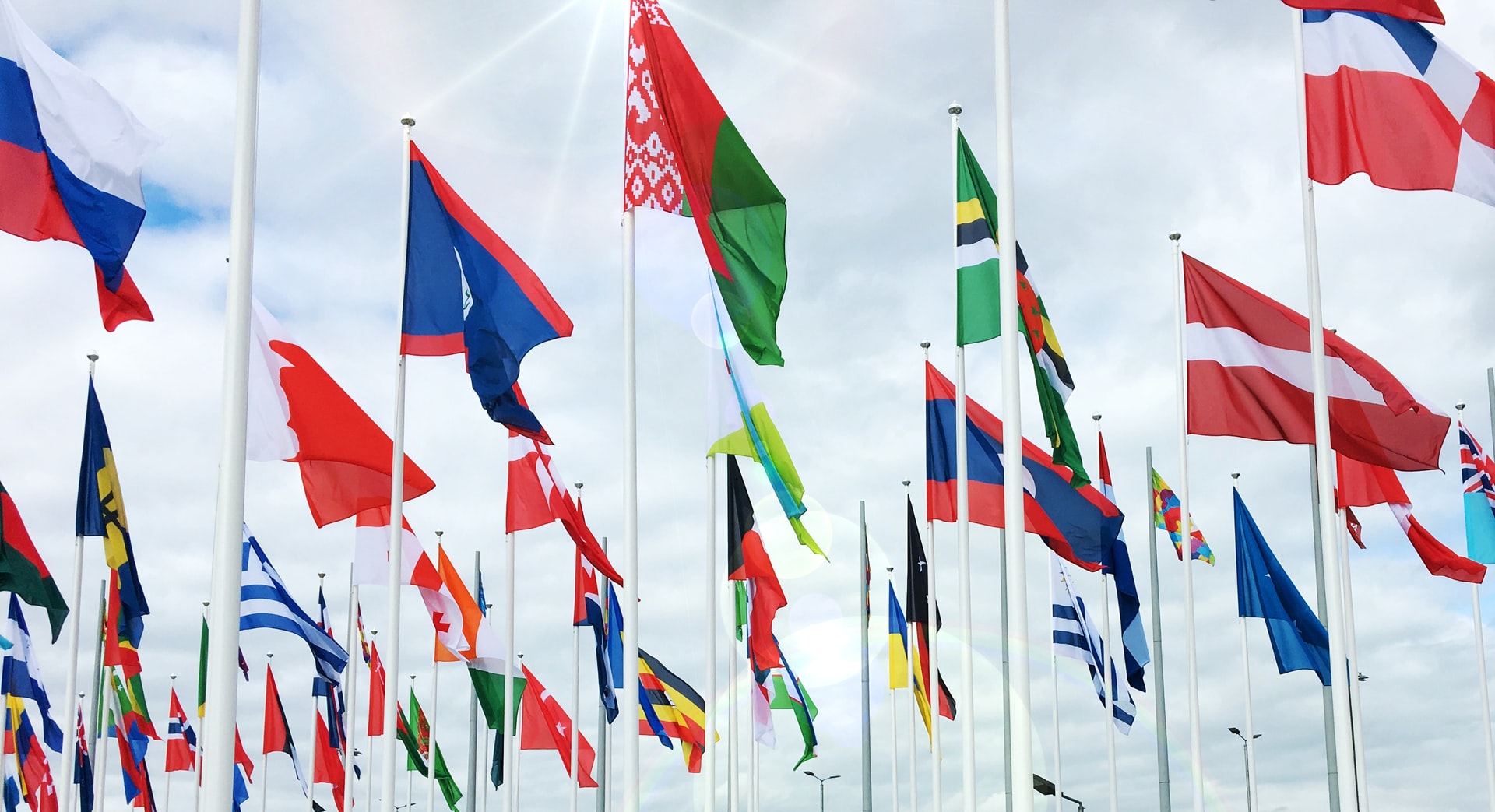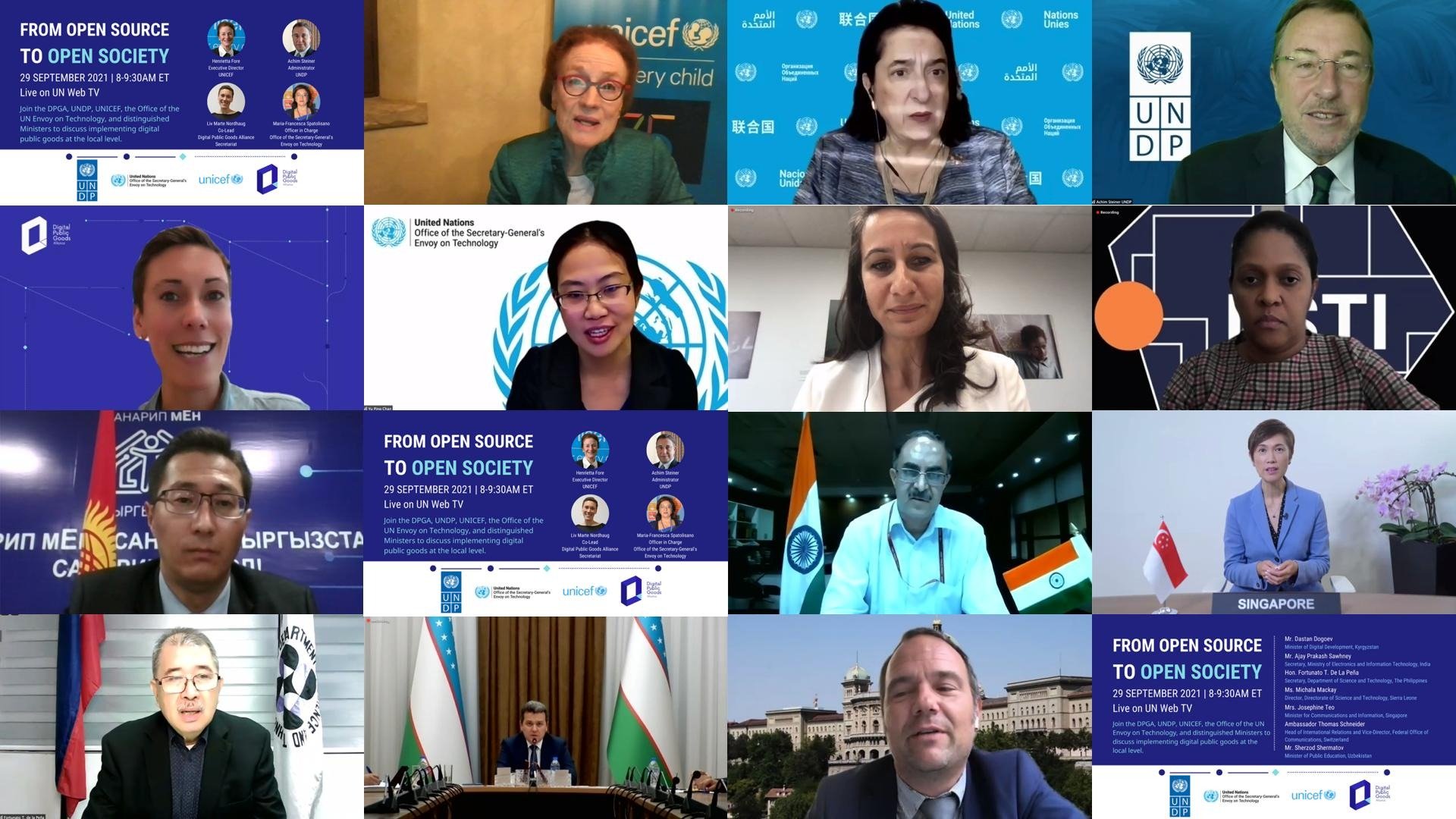Digital Public Goods at UNGA76

The Digital Public Goods Alliance co-hosted and participated in high level events during the United Nations General Assembly emphasizing open source and the importance of DPGs for building open culture and open societies in the UN and around the world.
The week of the United Nations General Assembly is an exciting time where policy-making and multilateral discussions are front and centre, and where ideas for collaboration are born.
But more than that, it’s also a time to set the agenda on the issues that will be prioritised throughout the year. This year, the DPGA and our members worked to ensure open source and digital public goods were on the agenda and that the four key areas of the DPGA Roadmap were represented. These efforts, in part, included co-hosting two events at UNGA76 alongside other key leaders in the DPG ecosystem — From Open Software to Open Society: Digital public goods for inclusive digital and social transformation and From Open Software to Open Culture: Opportunities and challenges of open source to support the United Nation mandate.
These events, and UNGA76 as a whole, represent a pivotal point in the collaborative action on DPGs and below are some of the key recommendations and commitments by governments and UN leaders that surfaced through both events.
From Open Software to Open Society: Digital public goods for inclusive digital and social transformation
This event brought together the UNDP, UNICEF, the Office of the UN Envoy on Technology, the Digital public Goods Alliance, and distinguished ministers from India, Kyrgyzstan, The Philippines, Sierra Leone, Singapore, Switzerland, and Uzbekistan. The discussion focused on the importance of advancing digital public goods for their potential equalizing benefits and what policy changes are needed in order to create an enabling environment to tackle global challenges using open source and digital public goods. Importantly, this event highlighted the work of governments implementing digital public goods.
This session explored practical strategies member states are using to leverage the potential of open source and DPGs to accelerate inclusive digital and social transformation especially in the context of COVID-19 adaptation and recovery. Key recommendations and commitments by governments and UN leaders included:
1. Capacity for developing and supporting DPGs within the UN, multilaterals and other organisations
Distinguished leaders including Henrietta Fore, Executive Director of UNICEF and Achim Steiner, UNDP Administrator, called on the UN community to follow the example set by member states by making software, models, data and content available for all as digital public goods on the DPG Registry. These efforts support capacity building by making digital solutions inclusive digitalisation assets for all actors. Participating ministers echoed this need:
- India called for strengthening technological cooperation between member states, including through South-South cooperation. Mr. Ajay Prakash Sawhney, Secretary, Ministry of Electronics and Information Technology, shared that, “digital public goods are an article of faith for India’s digital ecosystem”.
- Kyrgyzstan emphasized capacity building for open source and big data. Dastan Dogoev, Deputy Chairman of the Cabinet of Ministers and Minister of Digital Development for Kyrgyzstan, highlighted that collaboration is crucial, especially in building capacity in the areas of open source, big data and analytics.
- Uzbekistan shared their focus on digital development. The Minister of Public Education for Uzbekistan, Sherzod Shermatov, focused on the Digital Uzbekistan 2030 Strategy which includes an emphasis on the future of work and economic opportunities tied to information and communications technologies as a vital development mechanism.
2. Strengthening government capacity to deploy, maintain and evolve DPI and creating an enabling environment
Member states shared the innovative strategies they use to strengthen local capacity, and to create and deploy DPGs. From investing in citizens’ digital skills, to engaging the startup community, to reshaping the policy and investment landscape, government leaders have created a clear roadmap with their collective recommendations to create a robust ecosystem for DPGs at the country level. Examples included:
- Singapore identified the need to build international partnerships around interoperable systems so countries can collaborate and find new ways to close the digital divide. “We must uplift each other on our digital transformation journeys so we can emerge together stronger than ever to ensure our digital future” – Josephine Teo, Minister for Communications and Information.
- Sierra Leone emphasized the importance of local content and ecosystem development for DPGs. DPGA founding member Sierra Leone’s Director Michala Mackay from the Directorate of Science and Technology noted that, “we need to develop local content and support the ecosystem to not only build but also sustain these systems, this is an area where we look for more support”. This was a sentiment echoed by many of the other representatives.
- The Philippines highlighted the importance of startups. Honourable Fortunato T. De La Peña, Secretary for the Department of Science and Technology for the Republic of the Philippines, shared information about AEDES, the Philippines first digital public good and, based on that experience, encouraged other governments to partner with startups to deploy innovations.
- Switzerland highlighted the need for open standards in order to ensure interoperability. Thomas Schneider, Head of International Relations and Vice-Director of the Federal Office of Communications, brought attention to the need for the international community to address data exchange. “We need a clear framework for international data governance. We should not refrain from generating and utilising data, but people should gain control and self determination, and see concrete personal benefits from sharing their data.”
3. The importance of sourcing DPGs and making them more discoverable
Perhaps most importantly, there was a concerted call for making DPGs discoverable and available for local deployment. Following the UN leaders calls to increase the breadth and depth of DPGs available through the DPG Registry, members provided examples of their efforts to make their digital solutions widely available. Maria Spatolisano Francesca, Officer in Charge, Office of the Secretary-General’s Envoy on Technology – Assistant Secretary-General, underscored this need by sharing that since the publication of the Secretary-General’s Roadmap for Digital Cooperation, we have witnessed a great surge in activity, initiatives and partnerships around digital public goods and open source technologies.
Singapore committed to sharing their key digital solutions such as SingPass, their national digital ID system used by 70% of Singapore’s residents, and TraceTogether, their COVID-19 tracking app, and inviting other member states to use them. India also presented its own open source digital ID system serving 1.2 billion users which enables a wide range of digitised services as digital payments.
We echo Achim Steiner, UNDP Administrator, in calling for a whole-of-society approach to digital transformation and putting in place safeguards for technology by building DPG capacity, creating an enabling environment, and making these digital solutions more discoverable. Together these efforts can accelerate the attainment of the SDGs and ensure that no one is left behind.
If you missed this event, you can watch the recording here.

From Open Software to Open Culture: Opportunities and challenges of open source to support the United Nation mandate
Open source technologies are pivotal for better digital services for governments and institutions alike. This event focused on the role of open source within the UN. The panel of speakers emphasized why open source is critical for the work of the United Nations, particularly exemplifying and developing new ideas on how open source can be used as a test bed for co-creating new solutions to global challenges. These were the key takeaways:
- Investment in open source is generative: Maria Spatolisano Francesca, Officer in Charge, Office of the Secretary-General’s Envoy on Technology – Assistant Secretary-General, highlighted the new study on EU Open Source by Open Forum Europe which shows that an investment of €1 in open source generates returns of €4.
- For developing countries, engaging in open source can accelerate achievement of the SDGs: Bernardo Mariano Junior, Assistant Secretary-General & Chief Information Technology Officer, shared this sentiment and announced the establishment of an Open Source Program Office (OSPO) within the UN’s Office of Information and Communication Technology (OICT).
- A focus on procurement processes is essential: Paola Pisano, Former Minister for Technological Innovation, Researcher and Lecturer University of Torino, gave the example of working on legislation to address the need for 22,000 procurement centers in the Italian administration to first assess open source solutions before procuring proprietary software.
- Open collaboration and community contributions have power: Natalia Aristimuño, Acting Director of Digital Services at the European Commission DIGIT, highlighted the EU Open Source Strategy as an example of both.
- Both top-down and bottom-up approaches are needed: Shimon Shore, Chief, Open Source Programme, Israel Ministry of Science & Technology, underlined the need to include government and large organisations in institutionalising open source, and Sayeed Choudhury, Associate Dean for Research, Johns Hopkins University, emphasized the complementary approach of having individual champions creating and adopting open source solutions.
- Open source licensing is critical: OS licenses and their terms can be the conduit for effective open collaboration without additional legal frameworks for OS projects.
- There is a place for profit-making and proprietary business models in open source: Mala Kumar, Director of Tech for Social Good at GitHub, and Lucy Harris, Co-Lead of the Digital Public Goods Alliance Secretariat noted that the largest ICT companies are still some of the biggest contributors to open source and that building solutions on top of open source solutions can foster innovation and entrepreneurship.
Adapted from Maurizio Maria Gazzola Chief, Strategic Technology Solutions at the UN Office Information and Communication Technology (OICT): https://www.linkedin.com/posts/maurizio-maria-gazzola_unga76-event-opensource-activity-6847220879424839680-vwnX
The panel discussion included Acting Director of Digital Services at the European Commission DIGIT, Natalia Aristimuno Perez; Chief, Open Source Programme, Israel Ministry of Science & Technology, Shimon Shore; Secretariat Co-Lead, Digital Public Goods Alliance, Lucy Harris; Former Minister for Technological Innovation, Researcher and Lecturer University of Torino, Paola Pisano; Associate Dean for Research, Johns Hopkins University, Sayeed Choudhury; and Director of Tech for Social Good at GitHub, Mala Kumar and provided a forum for UN Secretariat staff, experts, and practitioners to discuss and share ideas on how to increase the understanding and awareness of the opportunities and challenges of open source, and to consider how to fully realise the potential of these technologies within the United Nations system.
If you missed the event, you can watch the recording here.